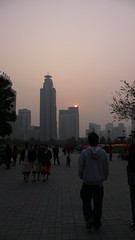China: Technology, Innovation and the Environment
Since the beginning of its economical opening -- when the first 5-year plans were devised in 1979 -- China has being growing at an incredible speed, with its GNP numbers jumping from 44 billion dollars to 1.6 trillion dollars in just 20 years.
Such growth has pushed the Chinese manufacturing industry into devouring huge amounts of natural resources in a alarming way: in 2004, China -- the 8th largest economy in GNP scale -- consumed 8% of all the oil, 31% of all the coal, 10% of all the electricity, 30% of all ore, 30% of all steel, 19% of all aluminum, 20% of all the copper and 40% of all cement produced in the world.
Adding such demand for natural resources to low efficiency means of production (the power-generation, steel and chemical industry in China spends 40% more energy in comparison to developed countries) and we get one of the most polluting countries in the planet: according to the World Bank, 6 out of the 10 the most polluted cities in the planet are in China.
Worries about the quality of life of its people -- as well as with its the capacity of continuing to grow in a sustainable way -- has recently lead the Chinese Central Government to changing its development macro-strategy for the next five years: new initiatives (both state-run and private) of development zones/projects will emphasize on environmental and sustainability issues. Sectors such as Information Technology, financial and tourism will be stimulated, and special incentives will be given to create investments on technological innovation.















Such growth has pushed the Chinese manufacturing industry into devouring huge amounts of natural resources in a alarming way: in 2004, China -- the 8th largest economy in GNP scale -- consumed 8% of all the oil, 31% of all the coal, 10% of all the electricity, 30% of all ore, 30% of all steel, 19% of all aluminum, 20% of all the copper and 40% of all cement produced in the world.
Adding such demand for natural resources to low efficiency means of production (the power-generation, steel and chemical industry in China spends 40% more energy in comparison to developed countries) and we get one of the most polluting countries in the planet: according to the World Bank, 6 out of the 10 the most polluted cities in the planet are in China.
UPDATE: I'm moving this blog to http://designative.info
Worries about the quality of life of its people -- as well as with its the capacity of continuing to grow in a sustainable way -- has recently lead the Chinese Central Government to changing its development macro-strategy for the next five years: new initiatives (both state-run and private) of development zones/projects will emphasize on environmental and sustainability issues. Sectors such as Information Technology, financial and tourism will be stimulated, and special incentives will be given to create investments on technological innovation.














No comments:
Post a Comment